News
On this page you find an overview of recent activities, blogs and publications by Tim Jackson; sometimes linking to other websites. For ongoing research projects, please also have a look at the CUSP website.

Why we need to adopt a Care Economy | C40 Cities podcast
Capitalism is an illness: it’s killing our planet, and by extension, us. Economic instability and environmental concerns are symptoms that can only be cured by redefining prosperity in terms of health and wellbeing, so that we can create sustainable, equitable societies. Tim Jackson joins Cities 1.5 to discuss his new book The Care Economy, arguing ...

Why Care is Key to a Thriving Economy | Book discussion at the David Hume Institute, Edinburgh
Hosted in partnership by the David Hume Institute and EICC Live, this engaging Edinburgh event featured Tim Jackson in conversation with Dr Sarah Birrell Ivory. Together, they explored the central themes of Tim’s latest book, The Care Economy.
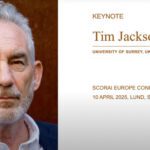
This is an act of care | Keynote by Tim Jackson at the #SCORAI 2025 conference
In his keynote for the SCORAI 2025 conference in Lund, Prof Tim Jackson presented insights from his new book The Care Economy, calling for a shift from growth-driven models to economies centred on health, care, and creativity. His keynote exposed the systemic harms of perpetual growth and argued that prioritising care is essential for a ...

Ökonomie der Fürsorge | Book discussion at Heinrich Böll Foundation, Berlin
To mark the launch of the German edition of The Care Economy, the Heinrich Böll Foundation hosted a special event in Berlin featuring Professor Tim Jackson in conversation with economist and historian Friederike Habermann. Together, they explored the book’s central themes, delving into its intellectual roots and discussing the urgent need to rethink our economic systems ...

The Care Economy | Book launch with Tim Jackson, Michael Dixon, Sam Everington and Zoe Williams
On 18 March, CUSP hosted a pre-release launch of The Care Economy at the London Review Bookshop. The evening featured a rich discussion with Professor Tim Jackson, Sir Michael Dixon, and Sir Sam Everington, moderated by Guardian journalist Zoe Williams, offering a thoughtful exploration of the book’s central themes.

Calling for growth is not the same as delivering it | The New Statesman
No political mantra, no tech-bro fantasy, no alluring macroeconomic ideology has stemmed the persistent decline of economic growth. Let alone reversed it. To all intents and purposes, Tim Jackson writes, we are already living in a postgrowth world.

Post-growth: the science of wellbeing within planetary boundaries | Journal Paper
A comprehensive new review by leading experts in the sustainability science field is challenging the long-held assumption that economic growth is necessary for societal progress. Published in The Lancet Planetary Health, this paper explores the rapidly advancing field of postgrowth research and presents a compelling case for prosperity without growth.

Macroeconomic, sectoral and financial dynamics in energy transitions: A stock-flow consistent, input-output approach.
This paper develops a stock-flow consistent, input-output model to simulate risks, opportunities, and non-linear dynamics associated with green investment, energy returns, financial risks, and various energy transition pathways to net zero.
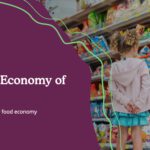
The False Economy of Big Food. And the case for a new food economy | Report
New analysis commissioned by the Food, Farming and Countryside Commission (FFCC) has found that the costs of Britain’s unhealthy food system amount to £268 billion every year – almost equivalent to the total annual UK healthcare spend. The report by Professor Tim Jackson provides the first comprehensive estimate of the food-related cost of chronic disease, ...

Growth and the planet | Reuters Podcast
Climate change is raising questions about a central tenet of economics: growth. Host Carmel Crimmins is joined by economist Tim Jackson to talk about consumerism and the environment and what “post growth” might look like. Plus, we hear from the person who compiles Bhutan’s Gross National Happiness index.
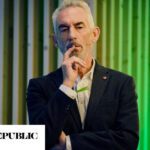
The British Economist Who Became a Celebrity With an Anti-Growth Pitch | Article by Nick Romeo for The New Republic
A profile of Tim Jackson, exploring his recent work and the challenges he’s tackling in the postgrowth field, written by Nick Romeo for the US magazine The New Republic. The piece is based on in-depth conversations and time Romeo spent accompanying Tim.

WHO non-communicable diseases Global Monitoring Framework: Pandemic resilience in sub-Saharan Africa and Low-income Countries | Journal Paper
This study provides an empirical assessment of how effective the WHO’s Global Monitoring Framework for non-communicable diseases (NCDs) has been in improving COVID-19 resilience in low-income countries. Our findings suggest that future global health policies should focus on the link between NCDs and infectious diseases, especially for vulnerable populations.

Health resilience and the global pandemic: the effect of social conditions on the COVID-19 mortality rate | Journal paper
This paper shows that countries with robust health-related policy targets aimed at reducing non-communicable diseases (NCDs) experienced significantly lower mortality rates during the first year of the Covid-19 pandemic.

Confronting the dilemma of growth. A response to Warlenius.
This commentary responds to a recent article purporting to identify ‘limits to degrowth’. This paper clarifies and sets in context the tensions between growth rates and decoupling rates on which the contested argument is based, disputing the claim that growth is the best way to achieve high rates of decoupling.

Growth dependency in the welfare state | Journal Paper
Modern economies rely on economic growth for stability and prosperity, but this dependence is ecologically unsustainable. Understanding growth dependency is crucial. This paper proposes a sector-led framework to transform these reliances and disrupt their inevitability.
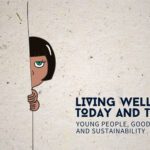
Living well today and tomorrow: young people, good life narratives, and sustainability | Working Paper
In this working paper, Anastasia Loukianov, Kate Burningham and Tim Jackson explore young people’s use of shared social understandings to describe what is important in their present lives, to envision their futures, and to respond to the challenges they identify to the realisation of their good lives.

Growth and climate | French Ministry of Economy and Finance conference with Tim Jackson
The French Ministry of Economy and Finance hosted a conference on 5 December to discuss the trade-offs between emission reduction policies and economic prosperity. Hosted by Minister Bruno Le Maire, speakers of the day included CUSP director Tim Jackson, Sandrine Dixson-Declève, Pierre-Olivier Gourinchas, and Bill Gates.
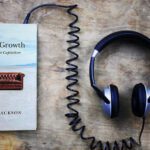
Audiobook | Post Growth—Life After Capitalism, narrated by Tim Jackson
We are pleased to announce the release of the audiobook edition of Tim Jackson’s prize-winning “Post Growth—Life After Capitalism”. Through his own narration, Tim brings a personal touch to the profound themes of Post Growth, offering an accessible and engaging experience for audiences to absorb his insights on the go.

Neoliberalism and its Discontents: Is Ecological Economics the Answer
Hosted by the former Mayor of Toronto, David Miller, this Cities 1.5 podcast with Tim Jackson is looking to translate the theoretical into the practical, by discussing what cities can do to deliver shared prosperity—not just an unsustainable goal of infinite growth.

Blame Capitalism: Degrowing Pains | Vox.com podcast
#TodayExplained Podcast with Tim Jackson investigating the ailing capitalist model, and ‘why the degrowth movement is having a moment’. Tim recently joined Noel King for her vox.com series on ‘Blame Capitalism’ to discuss the subject, and the emerging relevance of postgrowth economics and policy making.

Rishi Sunak’s ‘homage to catatonia’ | Blog
Rishi Sunak has rolled back the UK’s net zero policies and ripped up decades of cross-party consensus on climate change, Tim Jackson writes. “Perhaps consensus is a commodity yet more fragile than consciousness. But its disappearance carries a tragic sense of political and social loss.”

NZ International Science Festival
The New Zealand International Science Festival hosted Prof Jackson this year with the support of the British Council New Zealand and the Pacific. He is joined by the Director of the Centre For Sustainability, Caroline Orchinson, for this evening talk.

Why science needs the arts | Radio NZ programme with Tim Jackson
While we need less growth to put less demand on the planet’s resources and slow down climate change, CUSP director Tim Jackson argues that we need more art, more plays and works of fiction to bring both sides of that argument to life.

From Davos to Reykjavík: decoupling wellbeing from growth | Keynote at Icelandic Wellbeing Economy Forum, 12 June 2023
In June this year, Iceland’s Prime Minister Katrin Jakobsdóttir hosted the first Wellbeing Economy Forum in Reykjavík. Tim Jackson’s keynote there explored the relationship between the ‘wellbeing economy’ and the ‘growth economy’ teasing out where the logic of wellbeing differs from the logic of growth.

Full Circle Brussels: Imagining a postgrowth economy
To provide prosperity for all while respecting planetary boundaries, it is imperative we transcend both the conventional growth-centred worldview and our growth-dependent economic and social systems. Tim Jackson explores how to get there.

Imagining a postgrowth world | Speech at the EU Beyond Growth Conference, 17 May 2023
Growth is unsustainable. But the world beyond growth is frightening. We have built an economy that is dependent on growth. We must learn anew how society works, when the economy is not growing. And we need to confront the impossibility theorems presented to us by those who resist change.

The invisible heart: postgrowth economy as care | EU Beyond Growth Conference, 15 May 2023
Care is an anathema to capitalism. Its virtues are capitalism’s vices. Its employment-rich foundation for wellbeing is capitalism’s ‘productivity crisis’. Yet, without care we are nothing, our progress is nothing. Without care there is no economy.

Echoes of immortality: Art and the Wellbeing Economy
Sustainability is the art of living well within the ecological limits of a finite planet. Art is more than an instrument in this project. It’s the very nature of it.A talk delivered by Tim Jackson for the Wellbeing Economy Alliance Ireland Hub, March 2023.

Whose ‘flow’ is it anyway? The demographic correlates of ‘flow proneness’
This quantitative study of 4000 adults in the UK found that demographic factors only play a minimal role in explaining the likelihood of people being able to experience flow, suggesting that the rewards of flow may be available across society, irrespective of demographics.

Post Growth and the North-South Divide: a post-Keynesian stock-flow consistent analysis | Working Paper
This working paper describes a two-region post-Keynesian stock-flow consistent macroeconomic model set out to analyse macroeconomic implications of a postgrowth transition in advanced countries on the economic and environmental conditions in the rest of the world

Pathways towards Sustainable Prosperity in the EU | Second Post-Growth conference at EU Parliament
On 15-17 May 2023, scientists, politicians, policymakers and civil society organisations are gathering in Brussels for the second Post-Growth Conference for Europe. The event is a cross-party initiative of 20 Members of the European Parliament, supported by a wide-range of partner organisations.

Towards a Model of Baumol’s Cost Disease in a Postgrowth Economy—developments of the FALSTAFF stock-flow consistent (SFC) model
This working paper describes an extension of the stock-flow consistent FALSTAFF model to test the existence of a monetary growth imperative. The extension is designed to simulate the phenomenon known as Baumol’s cost disease which arises from the existence of differential labour productivity rates in a mixed economy.

Imagining life after capitalism | Radio NZ with Kim Hill
Tim Jackson was invited onto the Radio NZ Saturday Morning programme with Kim Hill to discus post-growth economics, staggering inequalities legitimated by the trickle-down ideology, and the motivation for his most recent book Post Growth-life after capitalism.

Without health there is no wealth. Why do so few governments understand this?—The Guardian Opinion
Politicians are wrong to believe that we can only afford decent care in good economic times, Tim Jackson writes. Without health there is no wealth. Without care there is no health. Care is investment. It’s not a luxury consumer item.

BBC Radio 4 Rethink Series | Green economy, money and prosperity
What may switching to a green economy mean for the way we live and work and is it compatible with economic growth? Together with his invited guests and co-hosts, Amol Rajan is exploring key questions around money, prosperity and the green economy.

Degrowth can work—here’s how science can help | Nature Article
Wealthy countries can create prosperity while using less materials and energy if they abandon economic growth as an objective. This Nature comment piece together with Jason Hickel, Giorgos Kallis, Julia Steinberger and more is laying out the key challenges of a just post-growth transition.

2022 Eric Zencey Prize in Ecological Economics for Tim Jackson’s book Post Growth: Life after Capitalism
Tim Jackson has been awarded the 2022 Eric Zencey Prize in Ecological Economics for his book Post Growth: Life after Capitalism. The prize celebrates outstanding writing on the environmental limits of a finite planet.

Sunak’s growth fetish is a problem: he’s heading for the same budget trap as Truss | The Guardian Opinion piece
The siren call of climate-burning expansion bewitches British politics. More of the same will emerge in the autumn statement, Tim Jackson writes. To all intents and purposes, we’re already living in a post-growth world. And it’s time to take that challenge seriously.

Is it time to rethink endless economic growth?—Guardian Science Weekly Podcast
In the Cop27 special, Ian Sample speaks to Tim Jackson about the myth of eternal growth, other ways to think about progress and prosperity, and what an economic system in balance with our planetary system might look like.

Economic Growth—can we ever have enough? | BBC Radio 4 Analysis
As the twin storms of economic turmoil and worsening climate change grip the the world, BBC Radio 4 Analysis examines the future of economic growth. Does it offer a route out of economic malaise, or have its benefits reached a ceiling for developed countries?

